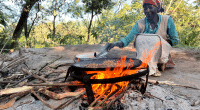Universal access to clean cooking worldwide will require an investment of $8 billion a year until 2030. According to a report published by the African Development Bank (AfDB) and the International Energy Agency (IEA), 2.5 billion people in the world still cook over wood fires, many of them in sub-Saharan Africa.
Access to clean cooking is essential if we are to achieve the development goals (SDGs) recommended by the United Nations (UN) by 2030. This situation affects at least 2.5 million people who still cook over wood fires or use other fuels such as charcoal, agricultural waste or animal dung to cook their food. Yet the gases emitted during combustion are the cause of numerous health problems in sub-Saharan Africa.
According to the report, air pollution caused by these rudimentary cooking methods is responsible for 3.7 million premature deaths a year, making it the third leading cause of premature mortality in the world. And despite this situation, “clean cooking is a subject that rarely makes the headlines or is rarely on the political agenda”, laments the IEA’s Executive Director. According to Fatih Birol, it is a cornerstone of global efforts to improve access to energy, gender equality, economic development and human dignity.
Universal access to clean cooking by 2030?
“Lack of access to clean cooking has a negative impact on public health, perpetuates deforestation and increases greenhouse gas (GHG) emissions. Universal access to modern energy by 2030 is imperative and requires game-changing approaches”, says Akinwumi Adesina, President of the African Development Bank (AfDB) Group, who co-signed the report “A vision of clean cooking for all” with the IEA.
Read also- AFRICA: Nefco and CCA to finance clean cooking south of the Sahara
Things can change. For this to happen, it will be necessary to invest 8 billion dollars a year in alternative solutions between now and 2030. These include improved stoves, but also less polluting energies such as biogas, produced from the fermentation of organic waste, and to some extent liquefied petroleum gas (LPG). In East Africa, mainly in Kenya and Rwanda, Koko Networks distributes bioethanol. Also used in petrol-powered cars, this biofuel is made from plant raw materials such as wheat, maize and beetroot.
There are solutions!
According to specialists, using bioethanol offers a number of advantages for the environment. Beetroot and cereals absorb large quantities of CO2 from the atmosphere as they grow through photosynthesis. They are then processed to produce bioethanol. The CO2 released during combustion corresponds to the CO2 absorbed during the growth of the biomass. Apart from deforestation, the benefits in terms of gender equality, health and time savings of universal access to clean cooking would be immense.
The report notes, for example, that premature deaths due to poor indoor air quality would fall by 2.5 million a year. The average household would gain at least 1.5 hours a day, freeing up time for other activities such as education or work, especially for women. If the $8 billion target is adopted, 300 million people (more than half of them in sub-Saharan Africa) should have access to clean cooking by 2030.
Jean Marie Takouleu







